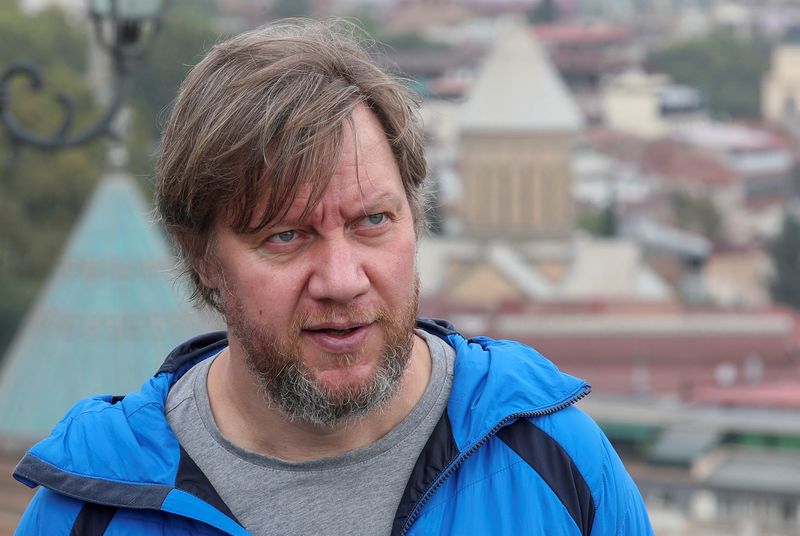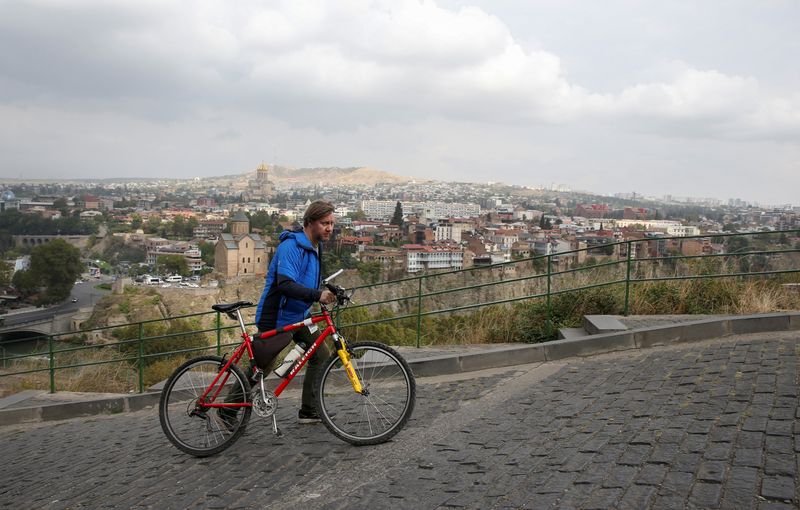By Jake Cordell
TBILISI (Reuters) – Igor Tikhiy, a 49-year-old marketing professional, has a simple answer to the question of why he fled to Georgia last week, crossing the border in the dead of night on his bicycle.
“I don’t want to shoot anybody. That’s why I’m here.”
He is one of thousands of Russian men who have left their country since President Vladimir Putin announced a nationwide mobilisation drive in a bid to recruit new manpower for Moscow’s war on Ukraine.
According to the mobilisation laws passed by the Kremlin and reassurances by officials, Igor’s age should mean he is not subject to the draft.
“In Russia, what’s written down is one thing but what they actually do is another. There are 50 year-olds being sent to the front. I don’t want to be among them,” he told Reuters in an interview in the Georgian capital of Tbilisi.
“I saw recruiters coming to my building with draft papers. I don’t want to be around to find out if they are coming for me,” he added.
After Putin ordered mobilisation, Igor, who lived in Moscow, packed his bags – and his bike – and flew to the southern Russian city of Vladikavkaz, some 32 km (20 miles) from the border with Georgia. Crossing in the middle of the night to avoid heavy queues, he then took a taxi some three hours south to Tbilisi, the Georgian capital.
It is a journey travelled by tens of thousands of Russians in the first weeks of Russia’s chaotic mobilisation.
Alexey, a 33-year-old who works in media, spent six days queuing in his car on the Russian side of the border. He didn’t sleep for the first 48 hours for fear of losing his place.
“It was a tough decision to leave, I thought about it for a long time. But I realised if I didn’t leave right now I might never be able to. Russia could close the borders,” he said.
Rumours of border closures have swirled around Moscow for weeks, denied by the Kremlin but viewed by many as credible.
Alexey said he considered abandoning his car and crossing on foot or bike, where the lines where shorter. Local media reports say dozens of cars had to be moved by police after their owners ditched them near the border.
“I don’t want to go to war. I don’t want to fight against a brotherly nation,” Alexey said of his reason for leaving.
FROSTY RECEPTION
On the streets of Tbilisi, the latest influx of Russians into a city of just 1 million is evident.
Large queues have formed outside banks and shops selling SIM cards, while cafes are dotted with young Russian men scouring AirBnB for a place to stay.
How many will remain and for how long is an open question. For those who cannot work remotely, finding a local job will be tough and housing costs have rocketed, say volunteers helping Russians to acclimatise.
Prior to mobilisation, more than 45,000 Russians had already opened bank accounts in Georgia this year, central bank data shows – more than doubling the number of Russian-held accounts in the country in the space of just six months.
The arrivals have stoked a mini economic boom, with an extra 1.2 billion Georgian lari ($430 million) flooding into Georgia through cross-border transfers, says the Institute for the Development of Freedom of Information, a Georgian think-tank.
But for some locals, there is a feeling of apprehension.
Ex-Soviet Georgia and Russia fought a short war in 2008 over Abkhazia and South Ossetia – two regions internationally recognised as part of Georgia but under the control of Russian-backed separatists.
The two countries still have no formal diplomatic relations and Georgian society was fiercely anti-Russian before Putin invaded Ukraine.
Some Georgian activists want their government to restrict Russian arrivals or close the border altogether. Under Georgia’s liberal immigration rules, Russians can effectively stay in the country indefinitely without a visa.
Around 300 people attended an anti-Russia protest outside Georgia’s parliament last Friday.
“They can be like a mine – an explosive – which can be used anytime by Putin,” said protester Tsotne Japaridze.
Many Russians, including Igor and Alexey, say they are against the war and want to integrate into Georgian society, but locals are sceptical.
“Even if we believe that all the Russians coming here oppose Putin… it’s still a problem,” said Lana Ghvinjilia at the protest.
“This is an influx of Russian culture, which we’ve been trying to liberate (ourselves from) over the last 30 years.”
($1 = 2.79 Georgian Lari)
(Reporting by David Chkhikvishvili and Jake Cordell; editing by Guy Faulconbridge and Gareth Jones)

